By Ella Ford/Arizona Sonora News
Two jet black speakers tower over the heads of the crowd; the floor beneath them shines underneath the blinding lights above. A long black cable snakes along the floor and grazes the side of the black polyester of a pair of dress slacks. It reaches its apex at the end of a black microphone. At the other end of the microphone is the evening’s entertainment.
A pair of piercing blue eyes lies underneath a tattered black fedora. Clean-shaven and smelling of pine, the headliner moves his lips to the words of Elvis Presley’s classic ballad “Can’t Help Falling in Love.” With a voice as rich as caramel, he sways from side to side as he serenades his silver-haired audience members.
Standing up from the table closest to him is an elderly Latina; her long silver hair flows as she steps closer to him. She reaches out her hands to him, letting the music carry her away. He wraps his free arm around her shoulders. She holds him by the waist, leaning her head against his shoulder. The two sway back and forth, gliding across the floor in a slow and tender dance. Tears of joy are streaming down her face, thankful to dance again after sitting in a stiff chair for so long.
“I love you so much,” she says to her dance partner. “Thank you for singing for us. Thank you.”
He smiles, his gentle eyes ensuring her that everything will be okay, that the moment will last for a lifetime.
“Thank you for listening,” he says, finishing the song and smiling down at her, overjoyed to have such a warm reception.
This is Phillip Harvey, a 35-year-old local jazz musician and self-proclaimed crooner. In the 10 years that Harvey has spent performing jazz music, he never thought he would reach the height of his small-time career by performing to the largest forgotten audience: elders with Alzheimer’s.
“It’s something else,” Harvey says, as he pauses to light a cigarette on the patio of his small apartment.
Pacing back and forth between the small apartment and the patio is Harvey’s son, Dylan, 11. With an energetic smile on his face, he hurries back inside to play a video game. Sitting in a brown recliner next to Harvey is his auburn-haired fiancée, Elizabeth Stanton, 25, listening in as Harvey unveils the story of his journey from a mere jazz appreciator to a bona fide performer.
Harvey moved from California over a decade ago after the birth of his first child. It was unclear what Harvey would do for work, but he knew that it would have something to do with his passion for jazz music.
Harvey’s love of jazz is one of a nostalgic upbringing. “I think back to when I was a kid in the ‘80s, there was a lot of jazz around me and in entertainment too,” Harvey says. He would sit for hours in front of the television, listening to the influences of jazz music in his favorite TV shows, from Looney Tunes to Seinfeld.
Yet no matter how much outside influence he had from his beloved television set, music was a fundamental part of his family as well. He’d spend hours listening to the music that his dad would play on the radio, and to family friends who would rave about the great jazz artists like his idol, Frank Sinatra.
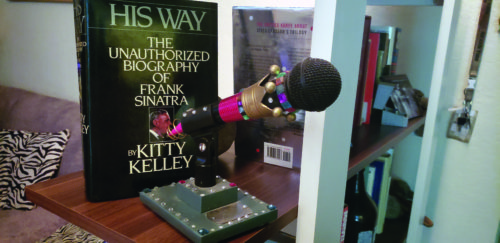
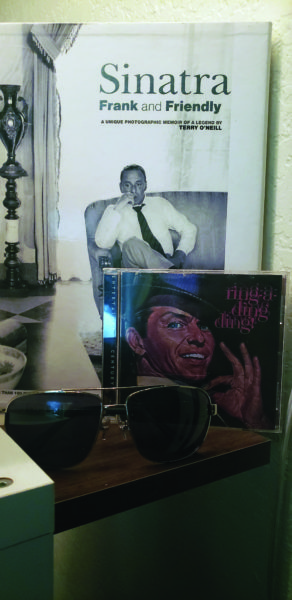
Harvey’s road to local fame was dotted with happy accidents and stumbling upon new opportunities for the first few years. “There was a karaoke event in Sunsites, Arizona, at this local bar called TJ’s, and that’s where I started singing … like I sang a little Sinatra and a little Dean Martin … and everybody enjoyed it,” Harvey says. “And I got a real buzz off of performing for people, even though I was just singing to a backing track that I played off my phone.”
Harvey eventually took over the event and began hosting TJ’s karaoke nights, yet these were meager feats in his mind. While he enjoyed his new line of work, it wasn’t bringing in enough finances to support both him and his family.
As fate would have it, Harvey moved to Tucson, and that was when his career began to fall into place. “I moved out here with my son, and we lived with my dad for a bit, and I was trying to just figure out what was next for me,” Harvey says.
In time, Harvey became host to two major events in downtown Tucson, an open mic night and a live musician’s jam session at a community maker space known as Maker House, where artists of all formats could gather and create their masterpieces.
“It scared the living bejesus out of me because I had never done anything like that before, and especially with other musicians, because I didn’t know a lick about music, really,” Harvey begins with a laugh. “Like I didn’t know how to read music, how to play an instrument, how to do anything except for sing and try to hold a note, and everyone around me had this vast knowledge that I just didn’t have.”
It was at Maker House where Harvey felt he could truly start to branch out and pursue his love of performing, and hopefully make a profit from it. “The great thing about the Maker House was that everyone was welcome,” Harvey begins, sipping on his coffee with a twinkle in his pale blue eyes. “You had people playing arcade games in one room, ladies knitting at a table and drinking beer in another room, people doing blues dancing in another room, and it was just fantastic because people could just do whatever they wanted to.”
Having found his community, Harvey threw himself into his new work, and he watched as both the jam sessions and the open mic nights grew larger and larger. “I took over the open mic night from two wonderful musicians, Jessica and Chris, and by that point it was already pretty big. I think around 100 people came to this thing,“ Harvey begins. “And so I took over and really just tried to keep it going, but I also wanted to open it to people who weren’t necessarily just musicians, like if someone wanted to do stand-up or poetry slams or anything, they could come up to the mic and just do it.”
Yet with all its joy and splendor, the community was short-lived: Maker House was forced to close in 2015. “From what I understand, it was just too expensive for the owners to keep going, you know?” Harvey says with a faint look of disappointment on his face.
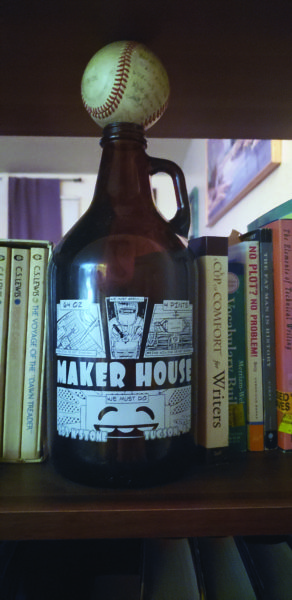
After Harvey and his fellow musician friends lost their artistic haven, Harvey was left with the same question he had asked himself when he first moved to Tucson: What now? With the help of one of the founders of the maker space, Harvey landed his first few gigs, from performing outside an Italian bakery to clubs like Playground.
Yet despite having worked hard to get where he is now, Harvey hardly considers his own willpower and perseverance to be the source of his success. “I got lucky because my thing is pretty niche,” Harvey says.
While Harvey cannot read or compose music himself, he manages to make his living by singing to instrumental backing tracks of the great jazz artists, including Frank Sinatra, Nat King Cole and even Bobby Darin.
A performance at the popular nightclub Playground in the summer of 2015 snowballed into a series of gigs for Harvey. Cocktail bars, speakeasies and festivals led way to the most interesting and most important performance venue of Harvey’s career at an assisted living facility for the elderly. “The elderly, in particular, have been fascinating because a lot of these people are having trouble with their memory,” Harvey says. “And a lot of the songs I sing are from a time when they grew up, when they were my age or younger.
“The elderly deserve our help and respect, and we don’t really give them enough of it,” Harvey begins as he elaborates on his first experiences. “A lot of these people are dealing with Alzheimer’s, early-onset dementia—that kind of thing—and for most people, you know, they don’t have the willpower to deal with it.”
There is a disconnect between the elderly and their families in Harvey’s mind. “What I think it comes down to is a lack of knowledge, a lack of understanding,” Harvey says. “People don’t really know what happens to the mind as it gets older and how diseases like Alzheimer’s impact it. Even I didn’t understand it when I first started out.”
While Harvey is not a neurologist, his understanding of the brain in regard to music is something that he pays extra attention to. “From what I’ve read and heard from people who study the brain is that the brain isn’t like a grid or a bunch of wires,” Harvey says.
“It’s like a series of different maps, and certain parts of the brain light up when doing certain things,” Stanton adds as she pours water into three glasses.
“Right, and so when music is added to the mix, a lot of the areas where memory exists kind of lights up and is activated in a way,” Harvey says, smiling at his bride-to-be.
“Music is the last thing to go in regards to your mind as you age,” Harvey begins. “There’s something about it. I don’t know if it’s the patterns of rhythm or what, but it is one of the last things to disappear from your memory. It’s really interesting, and that’s part of why I love my work so much.”
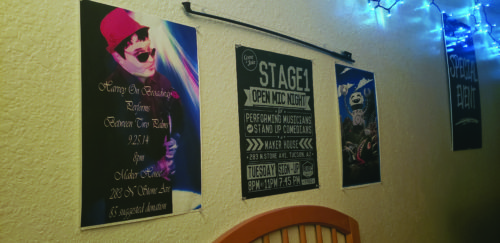
Watching the reactions of his elderly audience has caused Harvey to reflect honestly on his own life and the struggles with getting older. “I know I’m not in the best health that I could be, and Alzheimer’s and dementia are things that I know I’m probably going to have to worry about,” Harvey says. “I just hope that I can emulate the attitudes of the people I sing to because even though they’re not working anymore, they still want to have fun.”
“Or just a purpose, really,” Stanton chimes in. “So many older people will complain about not having something to do, and it’s not because they’re annoyed. It’s because they just need some kind of task to complete, which is what any human being would want, really.”
“Exactly,” Harvey replies. “What makes the brain deteriorate is just going through the motions of the day. Anything mundane isn’t challenging enough to keep the mind active. It’s no wonder that people are losing their memories when they’re not doing things that keep their brains stimulated.”
Harvey’s love for his work at assisted living facilities has sparked ideas to expand his business, and to seek out information on how to become a music therapist. “I don’t know if it’s even possible,” Harvey says, “but I’d love to do it if I could.”
However, the road to being a licensed music therapist isn’t a straightforward process. “It’s good that people are starting to recognize it as being important,” Harvey says. “But, even for me, there just doesn’t seem to be enough information out there about what you have to do in order to become one. It still seems like pretty new stuff.”
Even so, Harvey hopes to bring in other musicians to perform at assisted living facilities with him. “I know that not every person is going to like the music I perform,” Harvey begins. “Some people like rock music more or they want to listen to the Beatles. Heck, some people want to listen to like disco music, and that’s just not my style. If I brought in other musicians who perform different genres, then we could reach more people.”
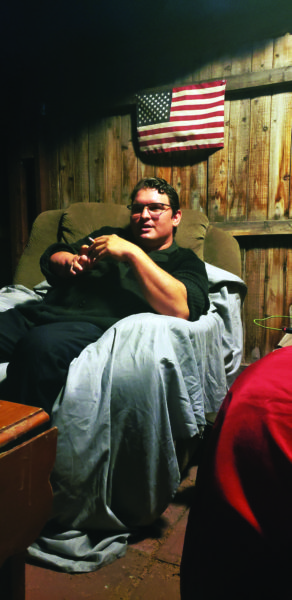
With plans to move to the Scottsdale area, Harvey hopes that he can spread his joy of singing to the elderly there and expand his business to cover more venues.
“I want to get an actual band to perform with, and who knows, I might even get this one to think that I’m pretty cool,” Harvey says jokingly, as he jostles his son’s shoulder.
“I already think you’re cool,” Dylan says somewhat begrudgingly.
“And I’m starting to learn how to play the piano,” Harvey adds. “Just like with everything else I do, I’m diving right into it and hoping for the best because at the end of the day, that’s all you can do.”
